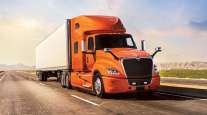Navistar CEO Sees Potential for Adaptable Truck Makers
This story appears in the April 1 print edition of Transport Topics.
LOUISVILLE, Ky. — The new leader of Navistar International Corp. said he sees profit opportunities for all truck makers, but warned they will have to wade through a difficult business environment, filled with regulatory and operational obstacles, as well as static demand for new trucks.
Troy Clarke, who is currently chief operating officer and will become CEO on April 15, said he does not anticipate a return to the North American peak years of 2005-2006, when nearly 300,000 new heavy trucks a year were sold in the United States and Canada.
Instead, 215,000 a year might be the stable level, said Clarke, who will succeed Lewis Campbell as CEO. He spoke at the annual breakfast put on by the Heavy Duty Manufacturers Association at the Mid-America Trucking Show here on March 22.
Despite regulations that can hinder truck makers and their customers, Clarke said “you can only blame Washington for so much” and that businesses will have to deal with economic uncertainty, which is always inevitable.
In speaking about Navistar, Clarke thanked the parts and components suppliers in the audience for standing with his company during its recent troubles. He said Navistar is making financial and operational progress after losing market share when it had to abandon its technology choice in truck engines.
Clarke said that manufacturers such as Navistar and its suppliers need to understand the current condition of their truck-buying customers to survive. He said the three main issues facing companies today are a need for better fuel economy, a profound shortage of qualified drivers and an ongoing influx of safety and environmental
regulations that raise costs and make operating more difficult.
Fuel efficiency is so critical, Clarke said, that “whatever advancements we make will never be enough. Diesel fuel is on a wild ride.”
Because of the diesel situation, natural gas as truck fuel will not be a fad, Clarke predicted.
“We’ve heard about hybrid and electric vehicles . . . but I think people are truly excited about natural gas,” he said. Clarke said the attributes of compressed and liquefied natural gas are that it’s plentiful, supplied domestically and has some environmental benefits.
Educated as an engineer, Clarke said of natural-gas vehicles, “It’s less complicated under the hood. It’s elegant.”
The elegance is costly, though, and Clarke said he would like to see CNG and LNG trucks come down in price, which he said could happen with more competition among manufacturers.
Clarke said environmental improvements for diesel engines in recent years have added $20,000 to the cost of a heavy-duty truck and $10,000 for a medium-duty. He thinks yet more regulations and costs are coming, but the driver shortage will exacerbate the problem, too.
To appeal to less-experienced drivers, Clarke said fleets will buy trucks that will be easier to drive because of equipment such as automated manual transmissions, lane-departure warning systems and blind-spot cameras, “but it will all come at a cost.”
Asked afterward if low-to-no growth in truck sales means manufacturers will have curtail the number of models they offer, Clarke said, not necessarily.
“The core cab for the trucks is basically the same,” he said. Manufacturers can provide the variety fleets crave by “grafting on” alterations to a basic module.
Clarke spent 35 years with General Motors Corp. prior to joining Navistar in 2010, and he said this “grafting” is a very common practice among carmakers.
Clarke is still using the services of James Hebe, a former Navistar senior vice president who left the company in October, two months after former Chairman and CEO Daniel Ustian departed. Hebe, now a Navistar consultant, was in attendance at Clarke’s speech. Clarke said the two men have traveled together on sales trips to major customers.
Hebe, who talked with customers and reporters at the back of the room after the speech, said he thinks fleet managers have learned from the roller-coaster buying binges of the last decade and will be less inclined to vary from their preferred buying patterns.




